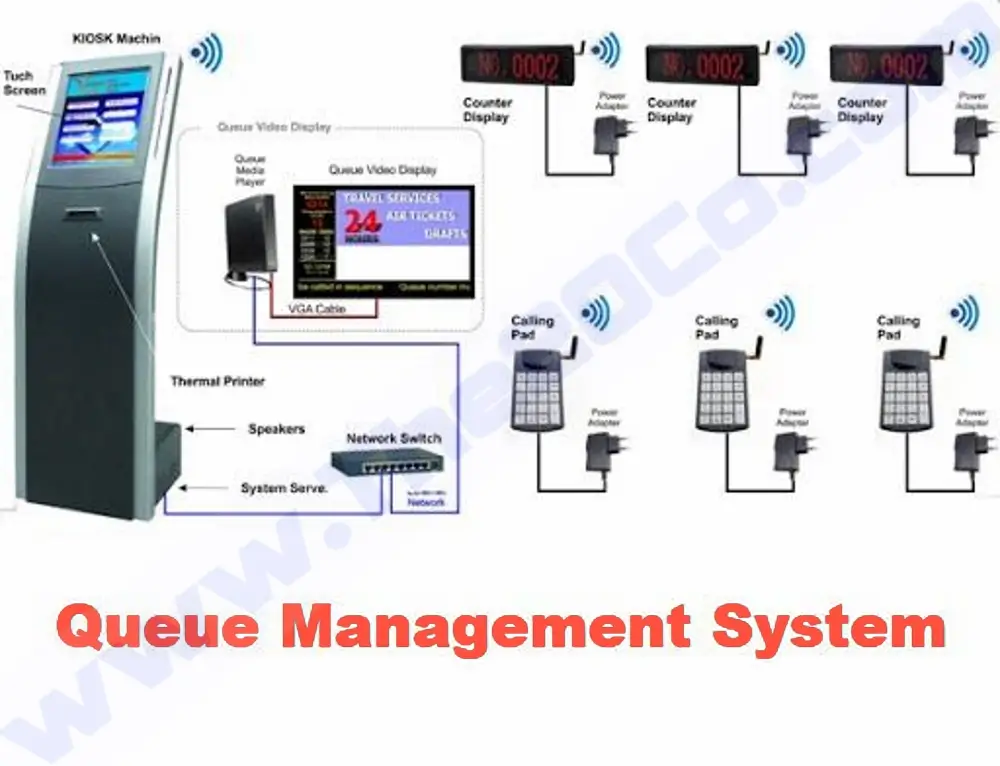Are you tired of waiting in long queues at a store, bank, or government office? Queue Management Systems can help you avoid long wait times, reduce customer frustration, and improve operational efficiency. In this article, we will explore what Queue Management Systems are, how they work, and the benefits they offer to businesses and customers alike.
What is a Queue Management System?
A Queue Management System (QMS) is a software solution that helps manage customer queues or lines. It can be used in various settings, such as banks, hospitals, retail stores, airports, government offices, and more. A QMS typically consists of hardware, such as a display screen, ticket dispenser, and sensors, and software that manages the queue and tracks customer wait times.
How does a Queue Management System work?
A typical Queue Management System works in the following way:
- The customer arrives at the store or office and takes a ticket from the dispenser or retail kiosk. The ticket has a number that indicates the customer’s place in the queue.
- The customer can then wait comfortably in a designated waiting area or leave and return when their number is called.
- The system displays the queue status on a screen or mobile app, showing the current wait time and the number of customers in the queue.
- The system alerts customers when it is their turn, either by calling their number or sending a notification to their mobile device.
- The customer proceeds to the designated service counter or station, where the staff is ready to assist them.
What are the benefits of a Queue Management System?
A Queue Management System offers many benefits to businesses and customers alike, including:
Improved customer experience
QMS can significantly reduce wait times, which leads to less customer frustration and better satisfaction. Customers can wait comfortably in a designated area, rather than standing in a long line, which improves their overall experience.
Increased operational efficiency
QMS can help businesses manage their operations more efficiently, reducing staffing requirements and costs. Staff can be assigned to different stations based on the demand, and the system can track the time taken to serve each customer, allowing businesses to optimize their processes.
Real-time data analytics
QMS can provide real-time data on queue times, customer wait times, and service times, allowing businesses to analyze their operations and make data-driven decisions. This information can be used to optimize staffing levels, reduce wait times, and improve customer service.
Improved customer satisfaction and loyalty
By reducing wait times and improving the overall customer experience, QMS can lead to increased customer satisfaction and loyalty. Satisfied customers are more likely to return to the business and recommend it to others, leading to increased revenue and growth.
How to choose a Queue Management System?
When choosing a Queue Management System, consider the following factors:
Business requirements
The QMS should meet the specific needs of your business, such as the number of service stations, the type of services provided, and the size of the waiting area.
Scalability and flexibility
The QMS should be able to scale up or down depending on the demand, and should be flexible enough to accommodate changes in the business operations.
User-friendliness
The QMS should be easy to use and understand for both customers and staff. The user interface should be intuitive and customizable to match the business branding.
Integration and compatibility
The QMS should be compatible with existing hardware and software systems, such as POS systems, CRM, and mobile apps. It should also be able to integrate with third-party systems if required.
Conclusion
Queue Management Systems offer many benefits to businesses and customers, including reduced wait times, increased operational efficiency, real-time data analytics, and improved customer satisfaction and loyalty. When choosing a QMS, businesses should consider their specific requirements, scalability and flexibility, user-friendliness, and integration and compatibility with existing systems.
In today’s fast-paced world, where time is a valuable commodity, Queue Management Systems can help businesses provide better customer experiences while optimizing their operations. With the right QMS in place, businesses can increase their efficiency, reduce wait times, and improve customer satisfaction and loyalty.
If you’re interested in implementing a Queue Management System for your business, contact a reputable QMS provider to discuss your options and find the right solution that meets your specific needs.

